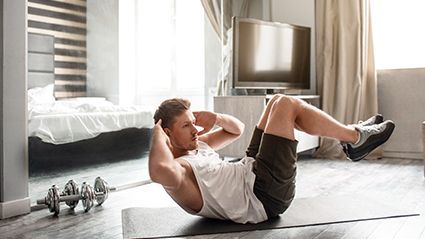FRIDAY, Jan. 22, 2021 (HealthDay News) — Not many people have had the opportunity to get the COVID-19 vaccine yet.
But while you wait your turn, there are some steps you can take to give the vaccine — whichever brand you get — a boost when it’s available to you.
An Ohio State University review of 49 vaccine studies dating back 30 years examined how stress, depression and healthy behaviors, such as exercise, can affect immune response to a vaccine.
Although it’s not realistic to entirely transform your health and habits in a few weeks or months, there are some steps everyone can take — even last-minute ones — to make a difference.
Those include getting good sleep as well as exercise in the days before and after you get your shot, said the review’s senior author, Janice Kiecolt-Glaser. She is director of Ohio State’s Institute for Behavioral Medicine Research, in Columbus.
“There are several things that are really reasonable and relatively easy,” she said.
Pandemic-related stress may have set people back when it comes to maintaining the behaviors that keep them healthier, the study authors noted. Recent data from around the world have revealed higher rates of depression and anxiety, more insomnia, increased alcohol sales and more overeating, according to the review.
The studies in this review looked at the effects of psychological factors and behaviors on immune response to a range of vaccines, including for influenza, hepatitis B, typhoid and pneumonia. This evidence is likely relevant to the COVID-19 vaccine, the researchers said.
“What we see is that stress can delay your antibody response to the vaccine,” Kiecolt-Glaser said. “It can also enhance side effects, and it may also mean that your protection may be shorter than people or later than people who were not stressed. So, it has a lot of unpleasant consequences.”
Past research has shown a variety of ways that immune response can be hampered. This includes slower immune response, gradually diminishing response and reduced antibodies.
Additional studies in Kiecolt-Glaser’s lab found people who were depressed had more post-vaccination side effects. Having some side effects is a normal response to vaccines.
Kiecolt-Glaser and her late husband, immunologist Ronald Glaser, are known as pioneers in mind-body research, including ways stress impairs physical health, according to a news release from Ohio State.
Previous research also showed a range of helpful behaviors, including massage, expressive writing for stress management, physical activity and nutritional supplements.
Sleep really matters, Kiecolt-Glaser said. She suggested trying to get a good night’s sleep for a couple of nights before your shot and a couple of nights afterward.
“You want to maximize sleep at these times, because sleep is really important for your immune system and being short on sleep makes your immune system less functional,” Kiecolt-Glaser said.
Though research shows that more physically fit people are likely to have a better vaccine response, there is also evidence that even short-term physical activity in the 24 hours before you get the vaccine can be beneficial, Kiecolt-Glaser said. She recommended a vigorous workout.
Some studies suggest that even 30 or 45 minutes of exercises for the arm you’re going to be vaccinated in may be helpful, Kiecolt-Glaser said.
“Whatever your state is when you have the opportunity to get the vaccine, obviously you want to get it, but you want to maximize your response,” she said. “And these are things that could be helpful in maximizing both the initial effectiveness of the vaccine and how quickly you respond, and also in terms of the durability of your vaccine response.”
The study also suggested eating a healthy diet, quitting or reducing smoking, and managing stress through exercise and mindfulness meditation. Seek professional help if you’re struggling with depression, the authors advised.
The review is accepted for publication in the journal Perspectives on Psychological Science.
Lynn Bufka, senior director of practice transformation and quality for the American Psychological Association, said the study contains important information that people should pay attention to amid the distress of the ongoing pandemic, systemic racism and political divisiveness.
“It underscores the necessity for each of us to do what we can and as a community, as a country, to do what we can to support the health and well-being of all individuals right now,” Bufka said.
It may be that obtaining the vaccine will help many people feel less distressed, depressed and overwhelmed, because they feel like there’s a little bit of hope coming, she added.
Bufka noted that during the pandemic, she has found it helpful to check in with herself and perhaps go for a walk if she hasn’t moved much that day. She hopes the review will reinforce the importance of attending to good overall immune health.
“It’s an opportunity for all of us to really look broadly at the information we know about what supports our well-being and to continue to make some adjustments,” Bufka said. “And the more that we can make those behaviors habits, the easier it is.”
More information
The U.S. Centers for Disease Control and Prevention has more on COVID-19 vaccination.
SOURCES: Janice Kiecolt-Glaser, PhD, director, Institute for Behavioral Medicine Research and professor, psychiatry and psychology, College of Medicine, Ohio State University, Columbus; Lynn Bufka, PhD, senior director of practice transformation and quality, American Psychological Association, Washington, D.C.; Ohio State University, news release, Jan. 13, 2021; Perspectives on Psychological Science
Copyright © 2026 HealthDay. All rights reserved.

